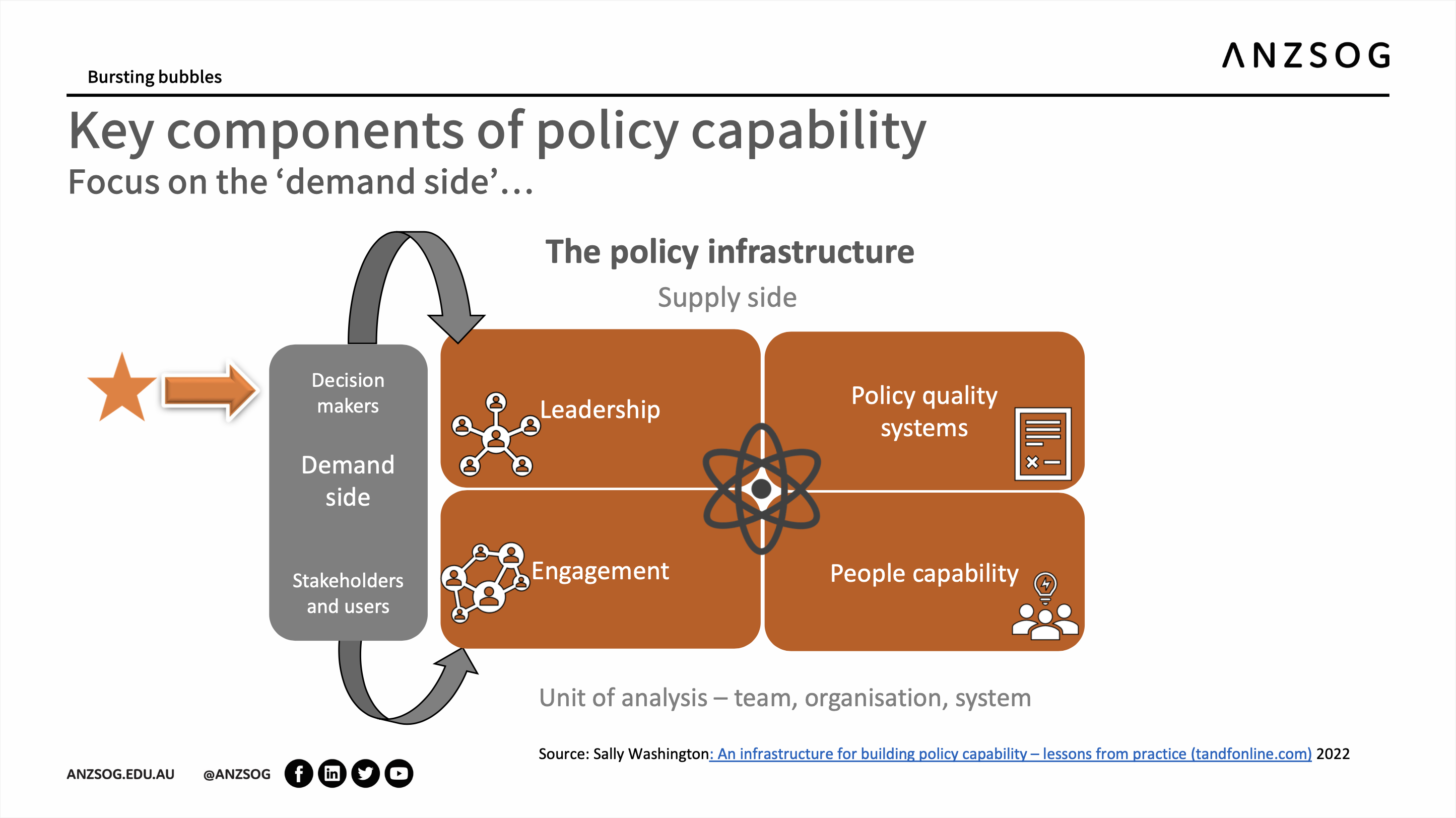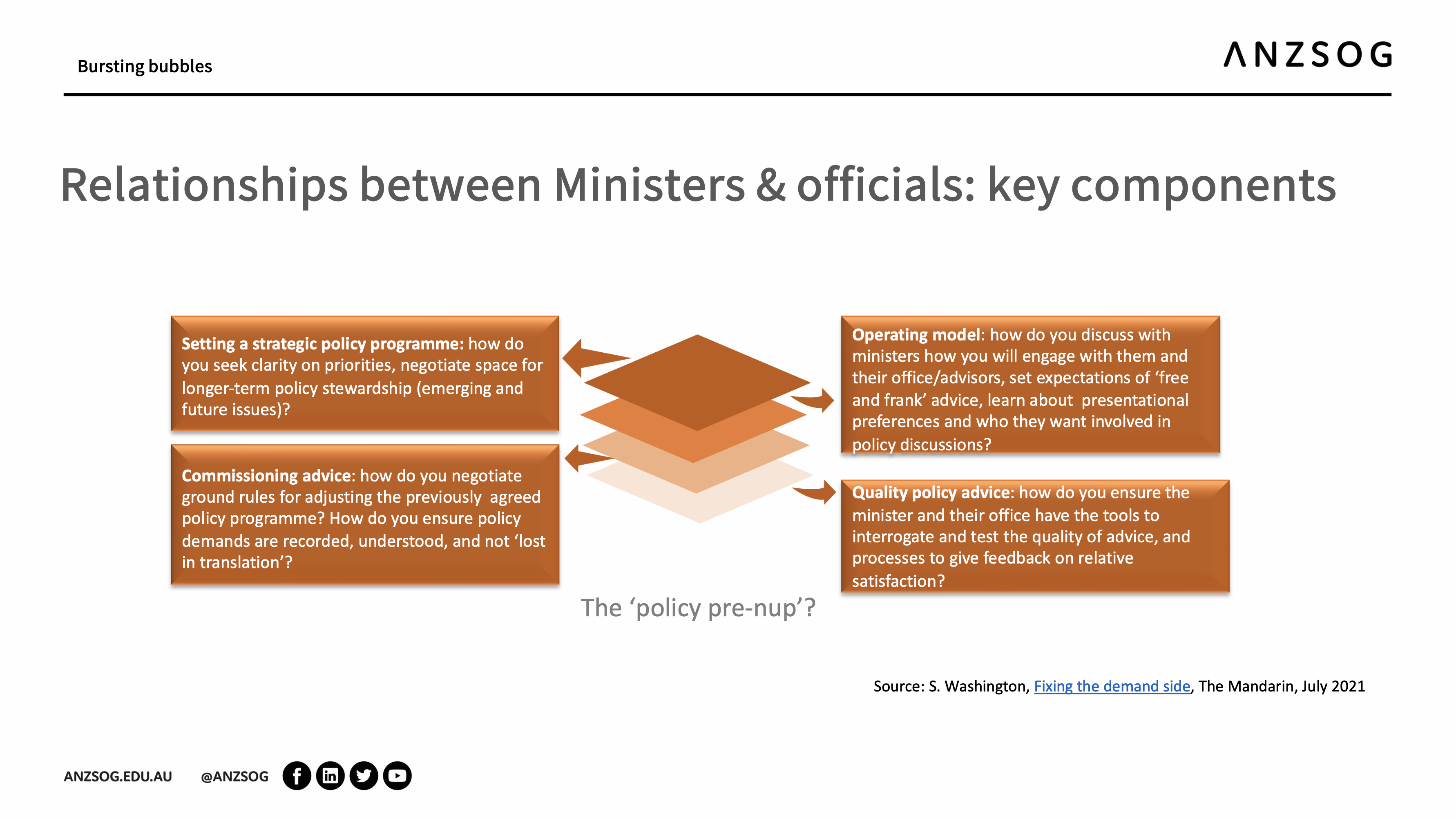The Institute was pleased to host Sally Washington on Thursday 31 August for the fourth session of our Bursting Bubbles series. Throughout the year this series has welcomed a range of speakers and topics as we aim to expand our thinking and ideas after COVID lockdowns. See more information on future Bursting Bubbles sessions.
Sally heads the Australia and New Zealand School of Government (ANZSOG) operations in Aotearoa New Zealand. She set up the New Zealand Policy Project, based in the Department of the Prime Minister and Cabinet. She worked for seven years at the OECD, where she managed a network of Heads of Prime Ministers’/Presidents’ Offices from OECD countries and has experience in policy roles and public sector reform in Aotearoa and internationally.
Sally’s presentation aimed to demystify and contextualise political nous and relationships at the administrative political interface. She argued that these relationships can be codified and built to improve policy capability and policy advice, and therefore improve decision-making. Sally drew on her previous experience, as well as recent conversations with policy practitioners and politicians, to examine and develop real-world frameworks and capability.

Policy capability
Sally identifies the need to improve policy capability and explains that her focus on the political administrative interface stems from examining how to deliver good advice and build the capability that underpins it. She argues that the ‘supply side’ of creating good advice for decision-makers means thinking about all the processes, systems and tools that underpin good advice. We also need to think about the ‘demand-side’ and how to work with decision-makers, understanding their role in policy, and how to shape the authorising environment of advice. Sally labels this the policy infrastructure.
The ‘policy pre-nup’
Sally likens the relationships between ministers and officials to a marriage (albeit often not long-term), and breaks down the dimensions of that relationship into what she terms the ‘policy pre-nup’. She identifies four key components, which are particularly salient at a time when we are entering election season and are anticipating a potential change or refresh of government and ministers. The four dimensions include:
- Setting a strategic programme – agreeing policy priorities and leaving space for policy stewardship (emerging and future issues).
- Commissioning advice – ground rules for new initiatives, adjusting the previously agreed policy programme, ensuring policy demands are not ‘lost in translation’.
- Operating models – rules of the game for engagement between the minister their office and officials, including expectations of ‘free and frank’ advice, and communication of presentational preferences.
- Quality policy advice- ensuring advice supports the decision-maker to take a fully-informed decision. Supporting ministers to be ‘intelligent customers’ of advice.

Relationships at the political administrative interface: getting them right
Sally set out some tips for improving relationships for both sides of the political administrative interface.
How can ministers ensure good relationships with officials?
It is important for ministers to be clear about achievement goals; set expectations of office staff; be able to ask good questions; invite ‘scary’ innovative ideas; and allow longer-term thinking in work programmes.
How can officials build good relationships with ministers?
For officials, it is important to provide free, frank and fearless advice; don’t try to be a ‘ministerial whisperer’; build trust with the decision-maker; be bold in proactively articulating challenges and including diverse views in advice; and exercise political nous.
She quoted Wayne Eagleson, long-serving Chief of Staff to previous Prime Ministers, who said “Understand the politics without getting involved in the politics”.
The DOs and DON’Ts of political nous
Sally observed that ‘political nous’ is a key policy skill but what it means in practice is rarely articulated. Drawing on discussions with policy practitioners and politicians, Sally spelt out what political nous looks when it is practised and when it is absent.
Sally identified six behaviours that demonstrate political nous:
- Navigate the complexity: hone political antennae in order to understand the political ecosystem in its complexity, including the channels of influence and unwritten signals.
- Hit the target: identify the right time and right place for approaching and communicating ideas to decision-makers … and acknowledge the ‘no-go zones’.
- Respect other pressures: decision-makers are exposed to many sources of advice, so ‘seek and articulate alignment’ with those other pressures.
- The power of persuasion: continue to develop a relationship of trust and confidence, strengthen and invest in future interactions.
- Know the rules: importantly, be across the rules, obligations, advice and guidelines provided – like the code of conduct and Cabinet Manual – to inform behaviour and the ongoing relationship.
- Have courageous conversations: be bold and proactive in giving advice.
Sally noted how political nous is most visible when it is not present. She explained how manifestations of political nous ‘do-nots’ are seen in five characters:
- The show-off: seeking the decision-maker’s attention for misplaced or self-motivated incentives
- The strident advocate: taking on the role of lobbyist rather than presenting evidence-based ideas
- The rogue: failing to follow due process
- The blabber-mouth: not respecting the minister’s privacy and being detrimentally over-transparent
- The sycophant: overtly seeking out the minister’s good books.
Good policy advice: what does it look like?
Sally recounts the early days setting up the Policy Project where she and the policy community collectively focused on getting ‘back to basics’ to articulate:
- What does a good policy organisation look like?
- What does good policy advice look like?
- What does a good policy adviser look like?
This resulted in three foundation frameworks launched by the Prime Minister in 2016: the Policy Capability Framework, the Policy Quality Framework, and the Policy Skills Framework. The Policy Skills Framework (recently refreshed), articulated the skills people need in policy advisory roles. In her session, Sally explained two of the skills most relevant to this discussion – ‘political nous’ and understanding ‘political context and priorities’. She examined these in terms of levels of skill, from developing (‘starting out’), to practising (‘a safe pair of hands’), to expert (‘top of the game’).
The Policy Skills Framework provides a way for people to be ‘looking at these different descriptions and thinking about where they are, and where they want to be’. These levels of skill are recorded in Sally’s presentation slides.
Building your political nous policy muscle
The practical pursuit of sharpening political nous can be part of learning and development, as Sally explained. Using the ratio of 70% learning on the job, 20% learning from others, and 10% formal learning, she suggests various examples of actions and opportunities for advancing skills for the developing, practising, and expert levels.
Sally emphasised that it is both collective and individual efforts that deliver results: thinking about what can be done at team and organisational levels to help people build their skills in the general policy space. ‘The bottom line is this is all about how do we create better decisions, how do we create better advice for better government decision-making that is going to be better for the people that the public service is here to serve?’
Sally’s insight and experience made for an engaging session, which can be viewed in its entirety on the Institute’s YouTube. More detailed advice is recorded on her presentation slides, which are invaluable and available throughout the video – we strongly recommend watching it through!
We are looking forward to the next Bursting Bubbles event: How to create, shape and design the future with Rik Athorne, which is from 5-6pm on Thursday 26 October. Register to join us in person at our Wellington office or over zoom.

